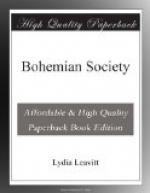Philanthropists in many ages and many lands have put forth great and noble efforts for the benefit of mankind and as we advance in knowledge and civilization the ways and means chosen have undergone many modifications. It has dawned upon philanthropists that they must have some knowledge of the religion of humanity before the change can be very marked, in the lives of those they would assist. The religion of humanity is the noblest, the grandest of all religions. It is the one which our Saviour taught while on earth; the one which he taught his disciples to follow; one which requires no trained intellect or cultivated mind, but simply an understanding of the human heart, the human mind, and human passions. In it there are no creeds to learn, no dogmas to understand, but the simple lesson of “Do unto others as you would they should do unto you,” which is the foundation of genuine religion. Phariseeism is the curse of modern times, “Stand aside for I am holier than thou,” is the spirit too often shown among—so called—Christians. The teaching of our Saviour; his life and good words mean little with many persons. The story of Mary Magdalen is simply a story, and conveys nothing to their minds. A supplication from such a one as she would meet with no return. The drawing of the skirts aside for fear of contamination, the cold looks and averted gaze, prove that at least, one noble lesson has been disregarded.
In the German town of Andernach there is a huge wooden image of the Saviour on the cross. And this is the legend which all the simple peasants believe.
“One stormy night a poor, sinful creature was wandering about the streets with her babe in her arms, and she was hungry and cold, homeless and friendless, and no one in Andernach would take her in. And when she came to the crucifix, she sat down on a stone at the foot of the cross and began to pray, and prayed till she fell asleep with her poor little babe on her bosom. But she did not sleep long, for a bright light shone full in her face, and when she opened her eyes she saw a pale man standing before her. He was almost naked, and there was blood upon his hands and body; and great tears stood in his beautiful eyes and his face was like the face of the Saviour on the cross. Not a word did he speak, but he looked at the woman compassionately, and gave her a loaf of bread, and took the babe in his arms and kissed it.”
No need to talk of spiritual things to people who are suffering from hunger and cold. If the moral nature of the poor is to be reformed, their surroundings must be improved. “The mind becomes that which it contemplates.” It would be impossible for any one surrounded by crime and poverty to understand or be made to comprehend the loving kindness of a God who placed them in such a condition and amidst such surroundings. No one, unless they were fanatics, would think of distributing religious tracts to the poor half starved ignorant portion of a large city. The human portion of their natures must be benefitted before any great results in moral improvements can be attained. Commence at the beginning. Teach them the laws of hygiene: teach them their duty, not from any reward which they may expect in the next world, but for the sake of right and the happiness it will afford them in this world.




